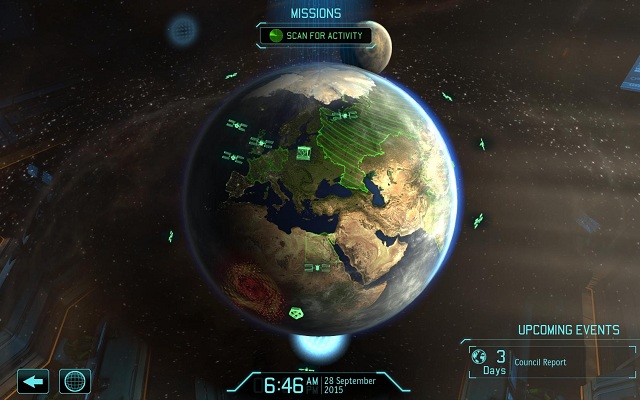
So you’ve carefully implemented the polices discussed in the tactical guide, and your soldiers are quite thankful that you’re no longer dashing them into flanked positions or sending them into harm’s way without so much as a Nano-fiber Vest.
But back at your base, China’s ready to leave the XCOM project, the U.S. is particularly unhappy with you letting a UFO slip through (which knocked out your satellite coverage over the country), and you never seem to have enough cash on hand.
Pull up a chair and take a seat, commander. The following eight tips should help you through the tough act of balancing global politics with saving humankind from extinction.
1. Don’t neglect your Satellite network
I cannot stress enough the importance of Satellites, which are possibly the most critical resource in the entire game. Satellites are your economy. Unlike the previous strategy entries in the X-Com series, the funding allocated to your clandestine paramilitary organization is not based directly on performance. The only way to increase your cash flow is to launch Satellites over each of the 16 Council-member nations.
Think of Satellites as the SCVs of XCOM. Just as with those gathering units of real-time strategy series StarCraft, you should always be building one. They have one of the longest construction times for any facility or Foundry project in the game (20 days), which should indicate just how important they are. The first thing you should do in a new campaign is start building a Satellite. Build them in advance. Build them whenever you have money.
They require a Satellite Uplink in your main base, but since this facility only takes 14 days to complete, you can time your Uplink and Satellite constructions to finish simultaneously when you start with Satellites first. Try to place Uplinks in a 2-by-2 square pattern for the adjacent bonuses, which should give you support for four extra for a total of 12. Later on, you can replace two Uplinks with Satellite Nexuses, which will provide the full 16 that you need for global coverage.
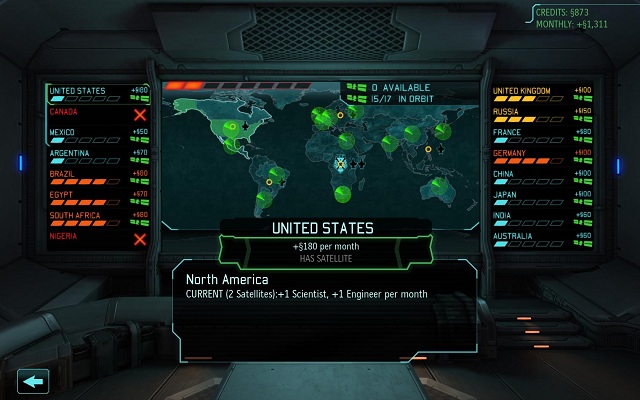
2. Launch Satellites near the end of the month
Satellites detect UFOs flying over a nation’s airspace, but they also significantly reduce the five-level panic rating of any country whenever you rocket them into orbit. And, aside from really botching a terror mission, countries in full hysteria wait until The Council’s end-of-the-month report to drop out of the XCOM organization.
You cannot bring any state you lose back into project; once they leave, that’s it. And their funding is gone for the rest of your campaign, so you want to prevent this whenever possible. Waiting until a few days before the month ends to launch Satellites is your best way to choose which Council members you want to stop from leaving.
3. Prioritize Satellite coverage
While stopping nations from dropping out should be your top priority, how should you pick winners and losers when you don’t have enough Satellites to keep everyone?
This is where the continent-specific bonuses come into play. They are as follows:
- North America: “Air and Space.” Halves the cost and maintenance of Interceptors.
- South America: “We Have Ways.” All alien autopsies and interrogations research instantly.
- Africa: “All In.” Increases Council member funding by 30 percent.
- Europe: “Expert Knowledge.” Halves the cost and maintenance of labs and workshops.
- Asia: “Future Combat.” Halves the cost of Officer Training School upgrades and Foundry projects.
You need to provide full Satellite coverage to a whole continent to earn any of these, so you should pick countries that will keep the opportunity for your preferred benefit available. In particular, Africa’s “All In” and Asia’s “Future Combat” are extremely useful early on.
Secondary to this, try to keep the highest-funding nations around. The United States offers the biggest payout, with Russia, China, and most European and Asian countries following.
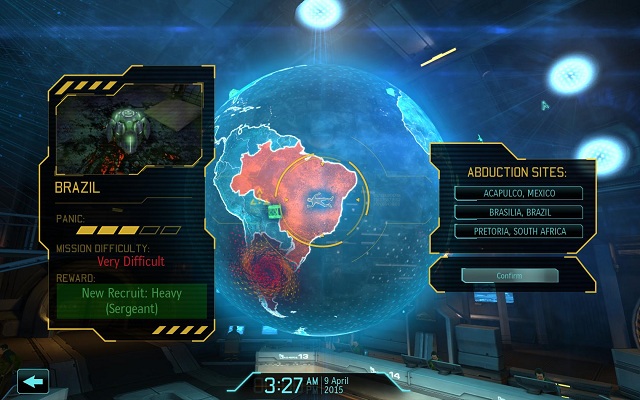
4. Pick alien abduction sites based on panic levels
A few times each month, you’ll get a report of up to three separate attacks happening simultaneously around the planet. You’re forced to choose one over the other two, which means that whichever countries you ignore will see their panic ratings increase.
Look carefully not just at the alert level of the mission site but also of the ratings of the surrounding nations. You can see the different colors on the globe itself while you select one of the three locations, or you can back out and head over to the Situation Room, where you can monitor panic a little more easily.
Early on, always pick the one set near those countries with the highest current alarm. You’ll increase your chances of the most nations sticking with the XCOM project. And if you’re confident that your team (and your tactical prowess) can handle the difficulty rating (“easy” through “very difficult”), definitely go for it.
5. Engineers are more valuable than scientists
Scientists determine your rate of tech progression, and while you don’t want to fall too far behind, you won’t face any penalties for learning slowly. Sure, you do want to discover better weapons and armors for your soldiers, but smart play in the squad-level skirmishes can go a long way.
Engineers, on the other hand, are a bottleneck to so many aspects of base progression. You need certain numbers of them to construct facilities at all, and each successive room of the same type requires more than the last. The more engineers you have, the less manufacturable items (such as Beam Weapons, Interceptors, and, yes, Satellites!) and Foundry research projects cost. You can never have enough engineers, and the more you have, the more you can do within your monthly budget.
You should build workshops whenever you can, which gives you an additional five engineers when completed. You should prioritize launching Satellites over countries that provide engineers at the end of each month. And you should go on abduction missions that reward engineers whenever you can.
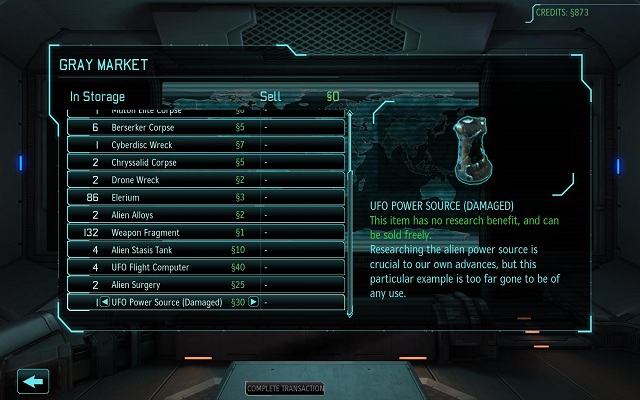
6. Clean out your closet frequently
You don’t quite have a black market in Enemy Unknown as you did in the other X-Com games. For instance, you can’t manufacture items at your discretion for the sole purpose of selling them to unknown buyers. But a “Gray Market” does exist, where you can sell alien artifacts to the 16 Council-member nations.
Damaged UFO Power Sources or Flight Computers are useless to your research department, so sell those immediately for easy cash. You should also sell extraneous items, like Alien Entertainment, right away. The game will clearly indicate what is OK to sell without any consequences.
Never, under any circumstances, sell Alien Alloys, some corpses, or Elerium. You’ll need each of these as necessary materials for a lot of manufacturable weapons, armors, and items in the game (especially Alloys!). You don’t want to be left short when you need to make those fancy new plasma weapons or flying armors! You can’t construct any of these on your own, either; you have to salvage them from missions (particularly UFO raids).
If you’re in a pinch, though — maybe your soldiers really need that Carapace Armor as soon as possible — sell multiples of unresearched, high-priced items and keep one for your scientists. But make sure you have all the required build materials first.
You’ll also receive requests from member nations for specific manufacturable items in exchange for cash or sometimes a few scientists or engineers. Always try to meet these requests if you can — the return on investment is always in your favor.
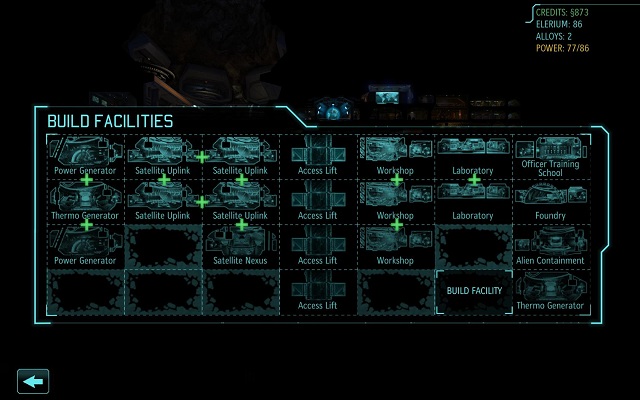
7. Take advantage of adjacent building bonuses
As I already mentioned with Uplinks, most buildings provide additional benefits when you place multiples of the same or similar type next to one another. For instance, Linked labs decrease the time required for research and workshops constructed together decrease build costs. Knowing this, you should always situate your base with adjacency in mind. Setting up columns of the same type of facility is the easiest approach.
Your 7-by-4 vertical plot will also have randomly located steam vents where you can place Thermo Generators, which provide much more power than regular Generators. Without power, you cannot construct new facilities, so plan ahead to have your Thermo Generators up and running quickly.
Some buildings — such as the Officer Training School, Foundry, and Alien Containment — do not confer any bonus simply because you won’t ever need more than one. When placing these, think about how their locations might disrupt a potential adjacency bonus.
8. Use Interceptor power-ups
These single-use items assist your fighter jets in shooting down UFOs. You can build three types: Track, which speeds the interceptor toward the alien craft; Aim, which forces the next two shots to hit; and Dodge, which forces the next two volleys of return fire against you to miss.
Early on, you won’t have the studier Firestorms to deal with large-class UFOs, and even in the late game, a Battleship might appear over a country where you haven’t stationed any. These power-ups can really increase your fragile Interceptors’ chances against the biggest spaceships.
You can only use one of each item per engagement, so carefully make your selections as the dogfight unfolds. Use Track if you have short-range armaments so you can start shooting back sooner. Use Aim and Dodge to score easy hits and keep your plane in the sky longer.
These power-ups are also one reason why you don’t want to sell certain alien corpses — you’ll need some as materials to construct them back at the base.

Follow these eight tips and you’ll turn a bumbling bureaucracy into an efficient machine capable of meeting the extraterrestrial threat on its own terms. But while you’re under no hard time constraints, you can’t dillydally, either. The invasion will progress with larger, more advanced UFOs and deadlier alien types regardless of what you do. Remember to keep watch of the Doom Tracker: If eight countries withdraw from the XCOM project, the world will pull the plug permanently.
Game over, man. Game over.
VentureBeat's mission is to be a digital town square for technical decision-makers to gain knowledge about transformative enterprise technology and transact. Learn More
